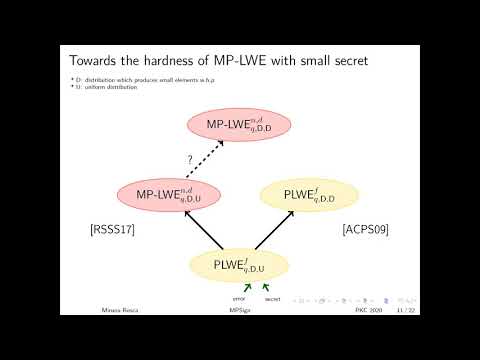CryptoDB
MPSign: A Signature from Small-Secret Middle-Product Learning with Errors
| Authors: | |
|---|---|
| Download: | |
| Presentation: | Slides |
| Abstract: | We describe a digital signature scheme $$mathsf {MPSign}$$ , whose security relies on the conjectured hardness of the Polynomial Learning With Errors problem ( $$mathsf {PLWE}$$ ) for at least one defining polynomial within an exponential-size family (as a function of the security parameter). The proposed signature scheme follows the Fiat-Shamir framework and can be viewed as the Learning With Errors counterpart of the signature scheme described by Lyubashevsky at Asiacrypt 2016, whose security relies on the conjectured hardness of the Polynomial Short Integer Solution ( $$mathsf {PSIS}$$ ) problem for at least one defining polynomial within an exponential-size family. As opposed to the latter, $$mathsf {MPSign}$$ enjoys a security proof from $$mathsf {PLWE}$$ that is tight in the quantum-access random oracle model. The main ingredient is a reduction from $$mathsf {PLWE}$$ for an arbitrary defining polynomial among exponentially many, to a variant of the Middle-Product Learning with Errors problem ( $$mathsf {MPLWE}$$ ) that allows for secrets that are small compared to the working modulus. We present concrete parameters for $$mathsf {MPSign}$$ using such small secrets, and show that they lead to significant savings in signature length over Lyubashevsky’s Asiacrypt 2016 scheme (which uses larger secrets) at typical security levels. As an additional small contribution, and in contrast to $$mathsf {MPSign}$$ (or $$mathsf {MPLWE}$$ ), we present an efficient key-recovery attack against Lyubashevsky’s scheme (or the inhomogeneous $$mathsf {PSIS}$$ problem), when it is used with sufficiently small secrets, showing the necessity of a lower bound on secret size for the security of that scheme. |
Video from PKC 2020
BibTeX
@article{pkc-2020-30305,
title={MPSign: A Signature from Small-Secret Middle-Product Learning with Errors},
booktitle={Public-Key Cryptography – PKC 2020},
series={Public-Key Cryptography – PKC 2020},
publisher={Springer},
volume={12111},
pages={66-93},
doi={10.1007/978-3-030-45388-6_3},
author={Shi Bai and Dipayan Das and Ryo Hiromasa and Miruna Rosca and Amin Sakzad and Damien Stehlé and Ron Steinfeld and Zhenfei Zhang},
year=2020
}

